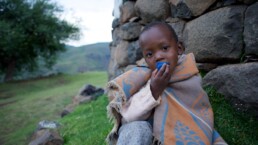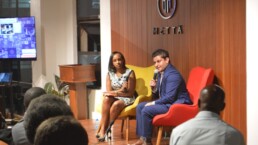Image: Bethlehem Alemu, CEO soleRebels
I do not know of a stronger ‘’tribe’’ than African women; they are a resilient, focused, determined, status-quo defying group that can multiply anything given to them. They are simply phenomenal.
Regional trade in Africa plays a pivotal role in diversifying economies and reducing dependence on imports of products; in delivering food and energy security; in generating jobs for the increasing numbers of young people; and in alleviating poverty and promoting shared prosperity. Without a doubt, women play an integral role in trade in Africa and are essential to the continents success in exploiting its trade potential.
There is mounting evidence to show that an increase in women in the labour force (both business and political) results in improved economic growth. In the middle-income economies particularly, women are paid less than their male counterparts. Some key contributing factors include the fact that, women:
- Are more likely to be wage workers and unpaid family workers;
- Are more likely to engage in low-productivity activities and to work in the informal sector, with less mobility to the formal sector than men;
- Are viewed as more economically dependent;
- Are in unorganized sectors or not represented in unions.
We see that more women work in vulnerable, low-paid, less-secure or undervalued jobs. What could be the underlying issues? Why do women seem to not maximize the opportunities and full benefits of trade and economic growth in Africa? Worse still, why do they not get the adequate economic reward, given their integral role?
I see the issue as two folded for African women in trade – first is the allocation of less empowering jobs to women, and secondly, is they have to work these jobs with less productive resources.
Jobs in the informal sector should not be considered an inferior form of employment. The informal sector, operating without legislation, makes it easier to exploit workers, with women being the most affected. Even with more women operating in this sector, it is usually the men who have better access to land rights and technology needed to be more productive, particularly in agribusiness.
At the LSE Summit in April 2018, Dr. Aida Opoku-Mensah- Special Advisor on SDGs and Agenda 2030, UN Economic Commission for Africa (UNECA) said, “We have many female entrepreneurs in the informal sector, the issue is enabling them. An enabling environment is key. This is the only way for the continent to absorb both its educated and entrepreneurial people”. The same issue of enablement identified by Dr. Opoku-Mensah, is to me, the solution!
The concept of shared responsibility and incentives to make it easier for both men and women to fully participate as much as they want, and contribute to the growth of the economy, is required. Women in the informal sector require more policies for their protection and empowerment. More attention needs to be placed towards factors that induce women entrepreneurs scaling their businesses into higher value-adding activities. Access to mentorship, networking, consulting services, education in basic business practices, skills training, market linkages and strengthening critical areas such as gender-specific content, can potentially lead to an increase and effectiveness of African women in trade.
A perpetual engagement in value-adding activities will translate into more women being empowered to grow their businesses. Women will also understand and appreciate the need to ‘’pay it forward’’ by mentoring other women within their communities. Regional governments and development partners also need to focus on addressing the systematic challenges that continue to slow women’s participation in business, including lack of access to adequate financing, lack of access to assets, and cultural norms affecting women’s property rights. Regular statistics about informal trade cannot be ignored, to ensure that those concerned are able to make better policy decisions.
In recent years, support programs for women entrepreneurs have gained traction and prominence as a means to create jobs and boost participation in trade and economic growth. In 2008, the Goldman Sachs Foundation launched the 10,000 Women Initiative. This initiative was designed specifically to provide business education; access to mentors and networks; and links to capital for 10,000 under-served women operating small businesses. By the close of 2013, the initiative had enrolled its 10,000th woman. Through similar beneficial initiatives, women begin to fully grasp the importance of growing their businesses, benefit from new economic opportunities and see themselves as an integral part of Africa’s growth.
According to the World Bank, Africa now has the highest growth of female-run enterprises across the world. Sharing of lessons learned by local entrepreneurial leaders and stakeholders, will go a long way to help map a path forward that addresses the needs of female entrepreneurs. Women are exceptional entrepreneurs, given the right tools to develop their growth. They thrive even in the face of dire circumstances.
Women often start by running informal retail or service businesses, but those who are ambitious and daring enough have created thousands of jobs and projects that break stereotypes about what women can do, physically and socially, in societies that are still largely conservative. Development economists note that if more women are supported, they can be a powerful force for global economic growth.
The few women who have been bold enough to venture out into business, and fortunate enough to access the right support, have done exceedingly well. It is about partnerships, with the conscious aim of driving trade and economic growth in Africa. With the integral role women continue to play, one can only expect that trade in Africa will take a beneficial turn for the continent.
I must say that there are some remarkable African women who are trailblazing heroes and are a source of inspiration to many, and I dedicate this piece to them, below are some of the African women who have hugely inspired me and many others:
Mo Abudu of Ebonylife TV, Folurunsho Alakija of Famfa Oil Limited, Adenike Ogunlesi of Ruff ‘n’ Tumble, Tara Fela-Durotoye of House of Tara International, Khanyi Dhlomo of Ndalo Media, Ada Osakwe of Agrolay Ventures, Bethlehem Alemu of soleRebel, Bolanle Austen-Peters of Terra Kulture, Betty Irabor of Genevieve Magazine, TY Bello of TY Bello Studios, Adesuwa Onyenokwe of Today’s Woman Magazine, Divine Ndhlukuka of Securico, Tosin Osinowo of Ile Ila, Saran Kaba Jones of FACE Africa, Funke Bucknor-Obruthe of Zapphire Events, Afua Osei and Yasmin Belo-Osagie of She Leads Africa, Titilayo Ogujiofor of Spread Errands, Ayo Megbope of No Leftovers, Ndidi Nwuneli of Aace Foods, Bisola Adeniyi of LadyBiba, Carmen Tal of MoroccanOil, Uche Pedro of BellaNaija, Joy Ndungutse & Janet Nkubana of Gahaya Links.
As I salute these women, I am equally cognisant of the fact that, I too have to pay it forward, and it is my commitment to use my skills, time and the platforms afforded me to do so. I am thankful my experience and role at the Presidential Enabling Business Environment Council (PEBEC), allows me to impact and help empower the lives of countless Micro Small Medium Enterprise owners – who are mostly women.
The views expressed in this article are those of the author alone and not the Future Africa Forum.
The views expressed in this article are those of the author and do not necessarily reflect the views of Future Africa Forum. Future Africa Forum is a pan-African policy think-tank and policy advisory consultancy headquartered in Nairobi, Kenya.



